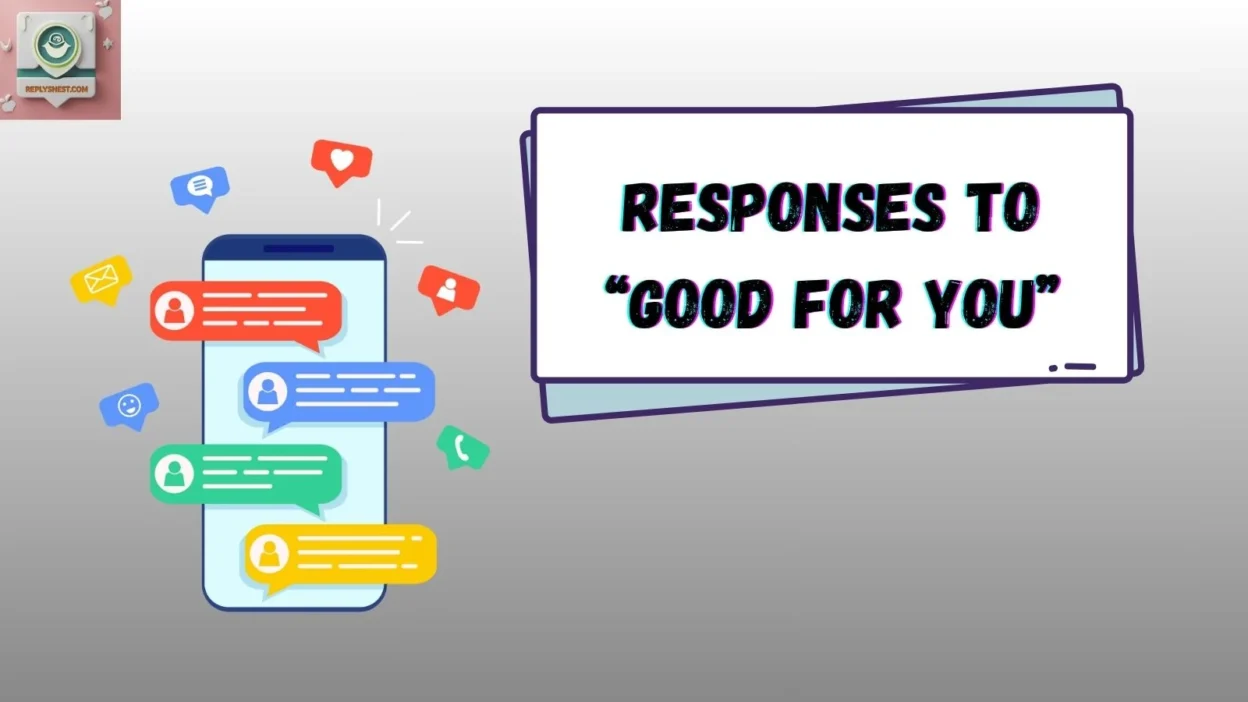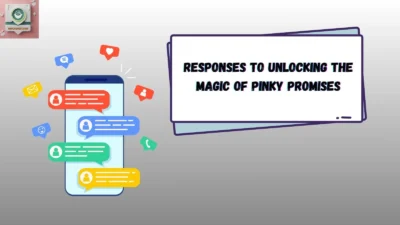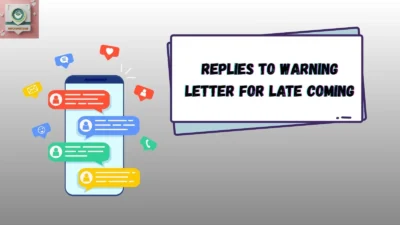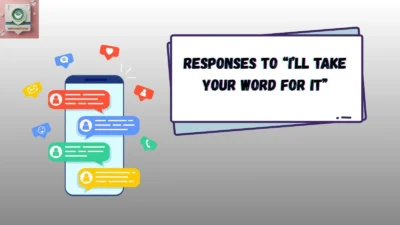Sometimes, when someone says “Good for you,” it feels supportive — like they’re genuinely happy for your success. Other times, it sounds a little sharp, maybe even a bit sarcastic. Knowing how to respond can make a big difference in keeping your communication kind, confident, and natural. Responses to “Good for You”.
When someone says “Good for you”, the tone, context, and emotion behind that phrase can completely change its meaning. I’ve often noticed that this simple statement can sound either polite and supportive or slightly sarcastic, depending on the attitude and sincerity of the speaker. If it’s a positive compliment, the best response is to appreciate the kind words—something like, “Thank you, I’ve been working hard, and I’m glad you noticed.” This kind of acknowledgment not only shows gratitude but also builds a deeper connection through humility and emotional intelligence.
However, in a more sarcastic or harsh scenario, staying calm and showing composure is the best move. A confident, witty, or even light-hearted reply—like “Guess my effort finally paid off!”—can defuse any negativity and keep the conversation positive. I’ve learned through many social interactions that your reaction to this expression defines your personality more than the words themselves. Whether it’s friends, family, or coworkers, replying with warmth, respect, and a bit of humor shows emotional maturity, self-awareness, and a balanced attitude.
1. “Thanks, I appreciate that.”
This simple yet warm reply shows humility and gratitude.
Best use: When someone sincerely praises your accomplishment.
Not to use: When the tone was sarcastic or dismissive.
Other ways to say:
- “That means a lot, thank you.”
- “I really appreciate you saying that.”
Example:
Friend: “You finally got the promotion? Good for you!”
You: “Thanks, I appreciate that.”
2. “I’ve been working hard on it!”
This response keeps the tone upbeat and confident.
Best use: When you want to acknowledge your effort without bragging.
Not to use: If you sense jealousy — it may come off as boastful.
Other ways to say: “It took a lot of work, but I’m proud of it.”
Example:
Colleague: “You landed the client? Good for you.”
You: “I’ve been working hard on it!”
3. “Thank you — that means a lot coming from you.”
A classy and gracious way to respond, especially to mentors or respected people.
Best use: When you value the person’s opinion.
Not to use: With someone being passive-aggressive.
Other ways to say: “That’s kind of you to say.”
Example:
Boss: “You’ve done an excellent job. Good for you.”
You: “Thank you — that means a lot coming from you.”
4. “I’m really proud of how it turned out.”
A confident yet humble way to own your achievement.
Best use: When talking about personal projects or creative work.
Not to use: In group settings where others contributed equally.
Other ways to say: “I’m happy with the result.”
Example:
Friend: “Your painting got featured? Good for you!”
You: “I’m really proud of how it turned out.”
5. “Thanks! I’m really excited about it.”
This response radiates genuine joy and positivity.
Best use: When you want to share your enthusiasm.
Not to use: If the other person seems upset about your success.
Other ways to say: “I can’t wait to see where it goes from here!”
Example:
Coworker: “You’re traveling again? Good for you.”
You: “Thanks! I’m really excited about it.”
6. “It’s been a long time coming.”
A grounded and humble response that acknowledges effort.
Best use: When your success took time or persistence.
Not to use: When it was an easy win — it can sound exaggerated.
Other ways to say: “It’s been quite a journey.”
Example:
Friend: “You finally got your dream job? Good for you.”
You: “It’s been a long time coming.”
7. “Haha, I’ll take that as a compliment.”
A friendly and humorous comeback that lightens the mood.
Best use: When you’re unsure if the comment was sincere.
Not to use: If you think the sarcasm might escalate.
Other ways to say: “I’ll pretend that was genuine.” (said playfully)
Example:
Coworker: “You’re moving up fast, huh? Good for you.”
You: “Haha, I’ll take that as a compliment.”
8. “I couldn’t have done it without support.”
This shows gratitude and humility.
Best use: When others helped you along the way.
Not to use: For solo achievements.
Other ways to say: “I had a lot of help from amazing people.”
Example:
Friend: “You finished the marathon? Good for you!”
You: “I couldn’t have done it without support.”
9. “It’s been quite a journey.”
This phrase adds depth and reflection to your response.
Best use: When sharing something meaningful or emotional.
Not to use: For minor achievements.
Other ways to say: “It’s been a rollercoaster, but worth it.”
Example:
Friend: “You finally graduated! Good for you.”
You: “It’s been quite a journey.”
10. “Thank you, I’m really grateful.”
Perfect for showing sincerity and emotional warmth.
Best use: When someone genuinely congratulates you.
Not to use: In sarcastic conversations.
Other ways to say: “I’m thankful for how things turned out.”
Example:
Family member: “You’re doing so well these days. Good for you.”
You: “Thank you, I’m really grateful.”
11. “That’s kind of you to say.”
Elegant, polite, and timeless.
Best use: In professional or polite conversations.
Not to use: With overly casual friends — may sound too formal.
Other ways to say: “I appreciate your kind words.”
Example:
Boss: “You’ve handled this beautifully. Good for you.”
You: “That’s kind of you to say.”
12. “It means a lot that you noticed.”
This one blends humility and connection.
Best use: When you feel genuinely seen.
Not to use: With people who are sarcastic or distant.
Other ways to say: “I appreciate you recognizing that.”
Example:
Colleague: “You’ve improved a lot. Good for you.”
You: “It means a lot that you noticed.”
13. “I’m trying my best!”
Humble and relatable — great for keeping things light.
Best use: For modest acknowledgment.
Not to use: When celebrating major milestones.
Other ways to say: “Just doing what I can!”
Example:
Friend: “You’re doing amazing in your fitness goals. Good for you.”
You: “I’m trying my best!”
14. “Haha, thanks — I’ll take the win.”
A lighthearted and confident response.
Best use: When someone’s tone is playful or teasing.
Not to use: In professional contexts.
Other ways to say: “I’ll count that as a victory.”
Example:
Friend: “You finally cooked something edible? Good for you.”
You: “Haha, thanks — I’ll take the win.”
15. “That means more than you think.”
A deeply personal and thoughtful response.
Best use: When the person’s words genuinely touched you.
Not to use: If it was a passing comment.
Other ways to say: “That really brightened my day.”
Example:
Mentor: “You’ve come a long way. Good for you.”
You: “That means more than you think.”
16. “Thanks, it’s been an adventure.”
Adds personality and humor to your reply.
Best use: When the journey was full of ups and downs.
Not to use: For routine or small wins.
Other ways to say: “It’s been quite the ride!”
Example:
Friend: “You started your own business? Good for you.”
You: “Thanks, it’s been an adventure.”
17. “I’m learning as I go!”
Shows humility and continuous growth.
Best use: When you’re still figuring things out.
Not to use: When talking about something you’ve mastered.
Other ways to say: “It’s all a learning process.”
Example:
Colleague: “You’re doing well for your first project. Good for you.”
You: “I’m learning as I go!”
18. “Appreciate the kind words.”
Short, warm, and polite — great for quick exchanges.
Best use: In texts, emails, or workplace chats.
Not to use: In close personal conversations.
Other ways to say: “Thanks for the encouragement.”
Example:
Boss: “That report was excellent. Good for you.”
You: “Appreciate the kind words.”
19. “It feels good to see progress.”
Encourages optimism and self-reflection.
Best use: When celebrating small wins.
Not to use: In sarcastic interactions.
Other ways to say: “I’m happy with how far I’ve come.”
Example:
Trainer: “You’re lifting heavier now! Good for you.”
You: “It feels good to see progress.”
20. “I’m just grateful for the opportunity.”
Grounded and modest — a great professional reply.
Best use: When someone congratulates you in a work setting.
Not to use: Among friends — may sound overly formal.
Other ways to say: “I’m thankful for the chance.”
Example:
Boss: “You led the meeting perfectly. Good for you.”
You: “I’m just grateful for the opportunity.”
21. “Haha, I’ll take that as encouragement.”
Keeps sarcasm from turning tense.
Best use: When the other person’s tone is unclear.
Not to use: When it’s genuine praise — it sounds too casual.
Other ways to say: “I’ll take that as support.”
Example:
Coworker: “You’re really stepping up, huh? Good for you.”
You: “Haha, I’ll take that as encouragement.”
22. “It’s nice to feel acknowledged.”
Soft and emotionally intelligent.
Best use: When you want to create emotional connection.
Not to use: In playful or casual situations.
Other ways to say: “It’s nice to feel seen.”
Example:
Friend: “You’ve changed a lot for the better. Good for you.”
You: “It’s nice to feel acknowledged.”
23. “I’m just happy to be moving forward.”
Optimistic and humble — a go-to for self-improvement moments.
Best use: When talking about personal growth.
Not to use: For small or humorous contexts.
Other ways to say: “Every step counts.”
Example:
Friend: “You seem more confident lately. Good for you.”
You: “I’m just happy to be moving forward.”
24. “Thank you — I’ve learned a lot along the way.”
Reflective and wise, showing maturity.
Best use: When someone acknowledges your progress or success.
Not to use: For quick replies — it’s better spoken with sincerity.
Other ways to say: “It’s been a huge learning curve.”
Example:
Colleague: “You’ve grown into your role so well. Good for you.”
You: “Thank you — I’ve learned a lot along the way.”
25. “Thanks! I’m really proud of this moment.”
End on a strong note — confident, warm, and grateful.
Best use: When celebrating a personal victory.
Not to use: When someone is being sarcastic or dismissive.
Other ways to say: “This means a lot to me.”
Example:
Friend: “You finally finished your degree. Good for you!”
You: “Thanks! I’m really proud of this moment.”
Conclusion
When someone says “Good for you,” their tone and intent make all the difference. A genuine comment deserves warmth and gratitude, while a snide remark might call for humor or grace. The key is to stay confident, kind, and emotionally aware — never letting someone’s tone disrupt your poise.
In my experience, the best response often depends on your energy: if you reply with calm confidence, you not only keep your dignity but often disarm sarcasm altogether.
So next time someone says “Good for you,” smile — and choose the response that feels most you.
10 Editor’s Picks (and Why People Love Them)
- “Thanks, I appreciate that.” – Timeless, polite, and universally warm.
- “Haha, I’ll take that as a compliment.” – Lightens sarcasm instantly.
- “I’ve been working hard on it!” – Shows pride without arrogance.
- “I couldn’t have done it without support.” – Humble and relatable.
- “It’s been quite a journey.” – Adds emotion and reflection.
- “That means more than you think.” – Touches hearts with sincerity.
- “I’m learning as I go!” – Keeps the tone approachable and real.
- “It feels good to see progress.” – Motivational and self-aware.
- “I’m just grateful for the opportunity.” – Excellent professional tone.
- “Thanks! I’m really proud of this moment.” – Confident yet grounded.



